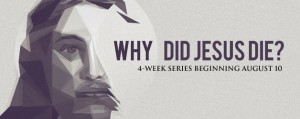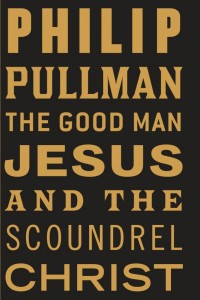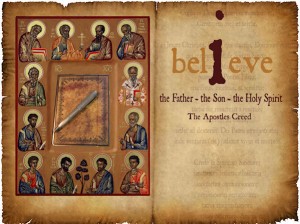
Some Things Are Just Essential
Sycamore Creek Church
July 31 & August 2
Tom Arthur
Peace friends!
When you pack to go on a trip, what are the essentials? When you buy a new car, what are the essentials? When you go to the grocery store, what are the essentials you need to bring home? Some things are just essential whatever you happen to be doing. The same thing is true when it comes to our faith. Some beliefs are just essential. Over the next five weeks we’re going to be looking at five essentials of belief.
This five-week series is what we like to call a belief-series. We do several kinds of series around here at Sycamore Creek. We do Buzz series. These are series designed to create a buzz for Big Day outreach events. Then we do HABITS series about spiritual practices. Once a year we do a vision series looking at the mission and vision of Sycamore Creek. Twice a year we do a Bible series. One series on an Old Testament book and one series on a New Testament book. Then we’ve got the holiday series of Lent/Easter and Christmas. And once a year we do a belief series looking at doctrine, theology, and beliefs.
Why do a belief series once a year? Why do beliefs matter? Beliefs matter because they have much to do with how you live. If you believe in an angry God, then you’ll live like God is out to get you. If you believe in an uninvolved and disinterested God, then you’ll live like God doesn’t care what you do. But if you believe in a loving God, then you’ll live like you’re on God’s mission in this world.
A good sermon speaks to your heart (emotions), hands and feet (action), tummy (humor), and head (intellect). Unless you think your brain, your mind, or your intellect is entirely unimportant, then our beliefs matter. So once a year we seek to speak to the head, your mind and intellect. That’s what we’ll be focusing on primarily over the next five weeks. We hope to hit the heart, hands and tummy along the way too!
Sola?
Back in 2013 a big conference came to Lansing. It’s probably not one that registered on many of your radars, but it was called Sola 13. It was hosted by the more reformed & “conservative” churches in the area. Some big name theologians and church leaders were in the area. It was too good to pass up. A couple of us went, but as I sat through some of it (I wasn’t able to attend all of it), I kept thinking, I agree with much of what is being taught, but I’d say it in a slightly different way or put a slightly different emphasis on it. This series is an opportunity to chart a more moderate (or middle way) course for the essentials of belief.
The word “sola” is Latin for “alone” or “solely.” There were five “solas” that were being discussed at this conference:
- (Sola) Christ Alone
- (Sola) Faith Alone
- (Sola) Grace Alone
- (Sola) Scripture Alone
- (Sola) God’s Glory Alone
These five solas come from the 16th Protestant Reformation. The Protestant Reformation was a “protest” movement against the Roman Catholic Church. It was a theological and political, even nationalistic, struggle. The debates often ended in life or death decisions. These solas really mattered to the founding fathers of the Protestant Reformation.
Most of you have probably heard of Martin Luther. He was the German monk who first broke from the Roman Catholic Church to found the Lutherans. In 1517 he nailed his 95 Theses to the Wittenberg church door. Luther was protesting most famously the Pope and the selling of indulgences (financial payments made to the church to raise money for remodeling St. Peter’s Basilica in Rome and get your relatives out of purgatory).
But Luther wasn’t the only Protestant reformer. Huldrych Zwingli and John Calvin founded reformation movements that resulted in the Reformed and Presbyterian churches in Switzerland (Zurich and Geneva). There was also the Radical Reformation which resulted in the Baptists, Mennonites, and other churches all across Europe. They were non-conformists (now you know why it’s so hard to talk to some Baptists…it’s in the DNA of their founding!) and non-state sponsored churches.
Then there was the Church of England or Anglican Church and its off-shoots—the Episcopalian Church in America and the Methodist churches (and later the Pentecostal churches). The Church of England officially broke from the Roman Catholic Church in 1534 when King Henry VIII wanted a divorce from his wife, Catherine of Aragon, because she wasn’t giving him a son, an heir to the throne. The Pope wouldn’t grant a divorce so King Henry VIII simply broke from the church and began his own. He became the head of the Church of England which eventually charted a middle way between Protestantism and Catholicism. Methodists are the descendants of that “middle way.” So let’s get back to the Solas…
Sola Polemics (Protestant vs. Catholic)
Each of the five Solas was an argument between the Protestants and the Roman Catholic Church. The five Solas and their arguments were:
- Christ Alone – You don’t need priests (and their role presiding over sacraments) as mediators.
- Grace Alone – You don’t deserve and aren’t entitled to anything, especially salvation.
- Faith Alone – You didn’t earn your salvation by good works.
- Scripture Alone – The Bible is enough without regard to the church’s tradition.
- Glory Alone – You don’t worship saints, the church, or anything except God.
These five Solas were life or death matters for most of the Protestant Reformers so they put them in strong “argumentative” language. These arguments from the sixteenth century are still alive today. Protestants are still protesting the beliefs of the Roman Catholic Church. In this series I want to chart a middle way.
Middle Way: Sola or Solus
Because the Church of England attempted a middle way between the Protestant Reformation and the Roman Catholic Church and the Methodist movement is a descendent of the Church of England (John Wesley, the founder of the Methodist movement was a priest in the Church of England during the 1700s), I’d like to suggest that these five Solas are best understood as five essentials or five primary beliefs. They aren’t “Sola” or “only’s” but they are “Solus” or “Primaries”:
- Primacy of Christ
- Primacy of Grace
- Primacy of Faith
- Primacy of Scripture
- Primacy of Glory
Today I want to look at the Primacy of Christ or the Essential beliefs we hold in Jesus Christ. I’d like to turn to the book of the Bible that tells the story of the beginning of the Church. Peter has healed a man in the name of Jesus and has been brought before the religious court of his day to explain why he’s healing in the name of Jesus, who that same religious court had crucified only days before.
Acts 4:8-12 NLT
Then Peter, filled with the Holy Spirit, said to them, “Rulers and elders of our people, are we being questioned today because we’ve done a good deed for a crippled man? Do you want to know how he was healed? Let me clearly state to all of you and to all the people of Israel that he was healed by the powerful name of Jesus Christ the Nazarene, the man you crucified but whom God raised from the dead. For Jesus is the one referred to in the Scriptures, where it says,
‘The stone that you builders rejected
has now become the cornerstone.’ (Psalm 118:22)
There is salvation in no one else! God has given no other name under heaven by which we must be saved.”
Jesus Alone is Essential and Primary
Let’s begin with a description of “Solus Christ” or the “Primacy of Christ.”
By virtue of who Jesus is (fully God and fully human) and what Jesus did (life, death, and resurrection), Jesus is the only all-sufficient (Anselm: Cur Deus Homo) atonement for sin (theosis/healing, christus victor/freedom, substitution/forgiveness). Therefore, salvation (the entire work of God’s grace: prevenient, convicting, justifying, sanctifying, and glorifying) is available only through Jesus Christ.
That’s a lot to chew on but that definition answers five questions:
- Who is Jesus?
- What did Jesus do?
- How does Jesus fix the problem?
- What are the results of Jesus’ solution?
- How do we receive this solution?
Let’s look at each of these five questions and their answers in turn.
- Who is Jesus?
Christians believe that Jesus is eternally fully God and fully human. Over time there was disagreement about this belief in Jesus. The Gnostics taught Docetism, that Jesus only seemed to be human (Jesus was NOT eternally fully God and fully HUMAN). Theodotius taught a belief that became known as adoptionism: Jesus was a mere man adopted as God’s Son (Jesus was NOT eternally fully GOD and fully human). Apollinaris taught that Jesus had a human body and divine mind (Jesus was NOT eternally FULLY God and FULLY human). Arius taught that Jesus was a created being (Jesus was NOT ETERNALLY fully God and fully human). And Nestorius taught that Jesus has one “new” nature (Jesus was NOT eternally fully God AND fully human). Jesus is essential and primary because he was eternally fully God and fully human.
- What did Jesus do?
There was a problem that Jesus fixed. The problem was sin, or straying from the path. We are all guilty of straying from the path (we do it unintentionally and intentionally). We are also broken from straying from the path (we were made to live on the path, not in the rough). Lastly, we are in bondage off the path (Off the path we’re in enemy occupied territory and held hostage). Jesus atoned for these problems. Atonement means being made “at-one-ment” or in harmony with God. Because of sin, we were out of harmony with God but Jesus fixed that. He fixed it with his life (his teaching, his exemplary model of perfectly living that teaching, and the community he called together to learn and live his teaching). Jesus fixed it by his death. Jesus was innocent of any crime and yet he willingly gave himself up for execution for each one of us. Jesus fixed the problem of sin with his resurrection. He was raised by the power of God and defeated and destroyed death. His resurrection proves that he was eternally fully God and fully human. Jesus’ resurrection is the first-fruit pointing to each of our resurrections when we are in Christ.
- How does Jesus fix the problem?
Why was Jesus essential or primary to fix the problem? Or why Christ alone? Why not another human? Why not an angel? Why not nothing (i.e. God just saves without atonement)? Anselm of Canterbury wrestled with this question in the 11th century and came up with this answer: Only God could fix the problem and only humanity needed it to be fixed, so a God-human was necessary and fitting or appropriate to fix the problem. Only God could deliver us from sin and only humanity needed to be delivered from sin. Only God could forgive sin and only humanity had to be forgiven of sin. Only God could absorb the disease of sin and only humanity had the disease of sin. Thus, a God-human was the solution. Jesus alone was the essential and primary solution to fixing the problem.
- What are the results of Jesus’ solution?
The results of Jesus’ solution is our salvation. Salvation is the entire work of God’s grace in our lives. God’s grace works “preveniently” before we even recognize it. God first loved us and we then respond to that love. God’s grace works to convict us of our disease, bondage, and guilt. God’s grace works to justify us or make us right with God. God’s grace works to sanctify us or mature us, complete us, and make us whole. God’s grace purifies us and perfects us in love. God’s grace glorifies us in the perfection and glory of heaven. Jesus alone is essential to unlocking God’s saving grace in our lives.
- How do we receive this atonement?
So how do we receive this solution, this atonement for our sin? We receive it through Christ’s work alone. There are three basic ways Christians have described who receives the benefits of God’s grace through Christ. One idea is called “exclusivism” (sometimes “particularism”). Exclusivists believe that only through conscious assent of the need for Christ and the reception of Christ as Lord and Savior is one saved. Exclusivists are very pessimistic about non-Christians receiving salvation.
On the other end of the spectrum is pluralism or universalism. Pluralists believe that all are saved. There are many paths up the mountain. Jesus is not the only way to salvation. He is not even necessarily the primary or essential way. He is just one way. Pluralists are extremely optimistic about the salvation of everyone.
Then there is the middle way called “Inclusivism.” I am an inclusivist. I believe that through Jesus’ life, death, and resurrection God is at work in every person bringing every knee to bow and tongue to confess that Jesus Christ alone is Lord whether they are cognizant of it or not. Inclusivists are optimistic about God’s grace at work in non-Christians. Inclusivists believe that Jesus is the way that all will eventually come to know God, some just don’t realize yet that it’s Jesus. Jesus is essential.
So What?
Why do all these beliefs matter? As I said at the beginning, what you believe has much to do with how you live. Do you believe that Jesus is essential? Have you received the gift of Jesus alone? When you understand that your situation is broken, that you are stuck in your sin, and that God left the comforts of heaven, that Jesus emptied himself of his right to heaven, and took on the weaknesses of flesh so that the weaknesses of flesh could take on the strength of his divinity, then you live differently. You ask for forgiveness for the ways you are complicit in your own sin. The only fitting response to God’s love becoming human in Jesus Christ is to love God back through Jesus Christ and to worship God through Jesus Christ. When you realize how much Jesus gave up so that you might be saved, you give your life back to Jesus as a “living sacrifice” to follow Jesus and spread the good news of Jesus to the entire world. You don’t live under the impression that God is an angry God out to get you, or a disinterested God not concerned with the problems of your life, but you live in God’s love joining the mission of God to the entire world. Jesus isn’t just one of many things important to your life. Jesus is primary. Jesus is essential. Jesus alone.
Prayer
God, forgive me for the ways I have sinned. Forgive me for the ways I have strayed from the path. Forgive me for the unintentional and intentional ways I have broken my relationship with you and those around me. Through Jesus Christ, forgive me, heal me, free me. Perfect your love in me. And let me share your mercy, your grace, and your love with all those around me. Make Jesus and his mission essential to my life. In Jesus’ name alone, amen!








Recent Comments